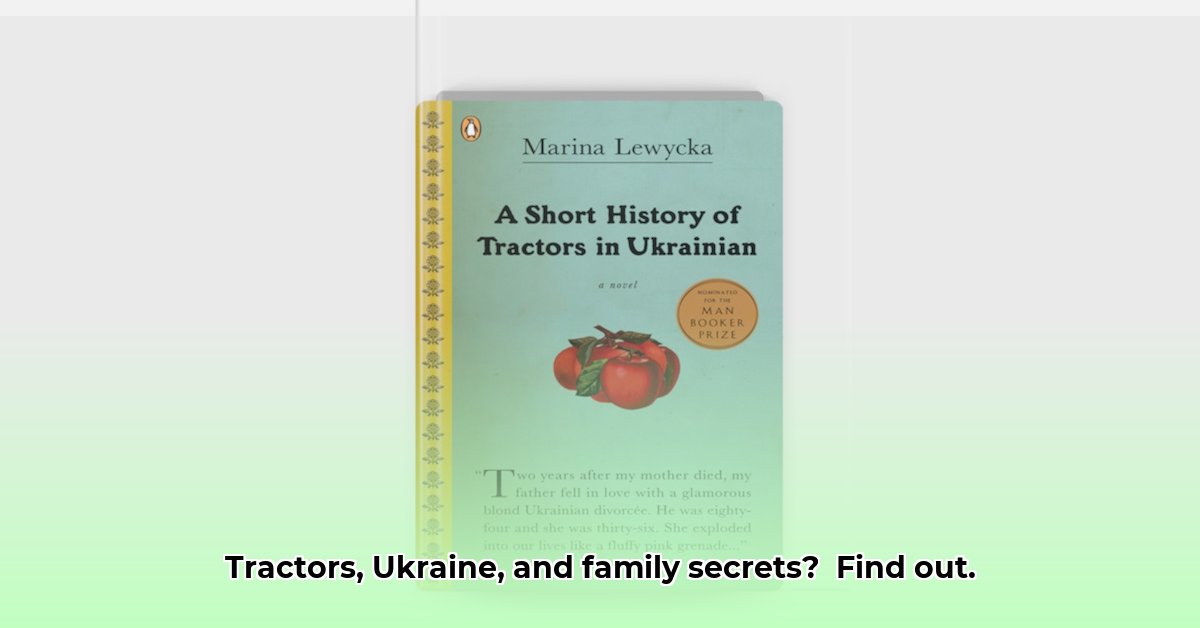
Marina Lewycka's A Short History of Tractors in Ukrainian isn't your typical family drama. It's a riotous, often poignant, exploration of family dynamics, cultural identity, and the surprising role of tractors in shaping Ukrainian history and the lives of its people. The novel's blend of humor and pathos has earned both widespread acclaim and some critical debate, sparking discussions about its portrayal of Ukrainian culture and the immigrant experience. This review delves into the novel's strengths and weaknesses, examining its narrative style, character development, and its unique use of the seemingly mundane tractor as a powerful symbol. For more information, visit the dedicated webpage.
A Whirlwind of Family and History
The story follows Thaddeus, a recently widowed, grumpy old man, and his much younger bride, Valentina. Their unconventional union throws his already chaotic family into a state of hilarious disarray. We experience the story through the eyes of Nikolai, Thaddeus' son, who navigates his own complicated relationships while grappling with his parents' unconventional choice. The simple premise quickly unfolds into a complex and insightful exploration of family dynamics, cultural clashes, and the enduring impact of the past. The seemingly ordinary tractor unexpectedly takes center stage, becoming a potent symbol interwoven throughout the narrative.
Tractors: Symbols of Resilience and Progress
The novel's title is far from arbitrary. The history of tractors in Ukraine, a history marked by both technological advancement and devastating political upheaval, forms an essential backdrop to the family's personal struggles. Tractors in Ukraine, particularly during the Soviet era, were inextricably linked to collectivization and the devastating famine known as the Holodomor. The novel subtly uses the image of the tractor—sometimes functioning, sometimes broken down—to mirror the family's own emotional ups and downs, their repairs representing the ongoing process of healing and reconciliation. This innovative use of symbolism elevates the narrative beyond a simple family drama.
A Masterful Blend of Humor and Pathos
Lewycka's writing is a masterclass in balancing humor and pathos. Her witty observations and laugh-out-loud moments are seamlessly interwoven with poignant reflections on family, loss, and the enduring strength of the human spirit. The characters, while at times exaggerated for comedic effect, feel remarkably authentic in their flaws and complexities. This blend resonates deeply, eliciting both laughter and genuine empathy from the reader. The novel's success stems, in part, from this masterful control of tone.
Critical Reception: A Spectrum of Opinions
While the novel has garnered largely positive reviews, praising its engaging narrative and witty prose, some critics have noted that certain characters feel one-dimensional, and the multiple storylines sometimes feel overwhelming. Interestingly, these criticisms are not universally shared, with differences in interpretation often linked to cultural background and personal experiences. This variance highlights the subjective nature of literary interpretation and the importance of considering cultural context. The differing interpretations, however, only serve to enrich the dialogue surrounding the novel's themes.
Who Should Read This Hilarious Saga?
A Short History of Tractors in Ukrainian is a must-read for those who appreciate strong characters, nuanced humor, and a touch of social commentary. It's a compelling story that stays with you long after you turn the final page. While the multiple plot lines might prove challenging for some, the rewards are significant for those willing to fully engage with its interwoven narratives and powerful symbolism. The unique blend of family drama, Ukrainian history, and the surprisingly poignant role of tractors makes this a truly unforgettable read. It’s a satisfying read for those seeking a humorous yet insightful exploration of family, heritage, and the enduring legacy of the past.